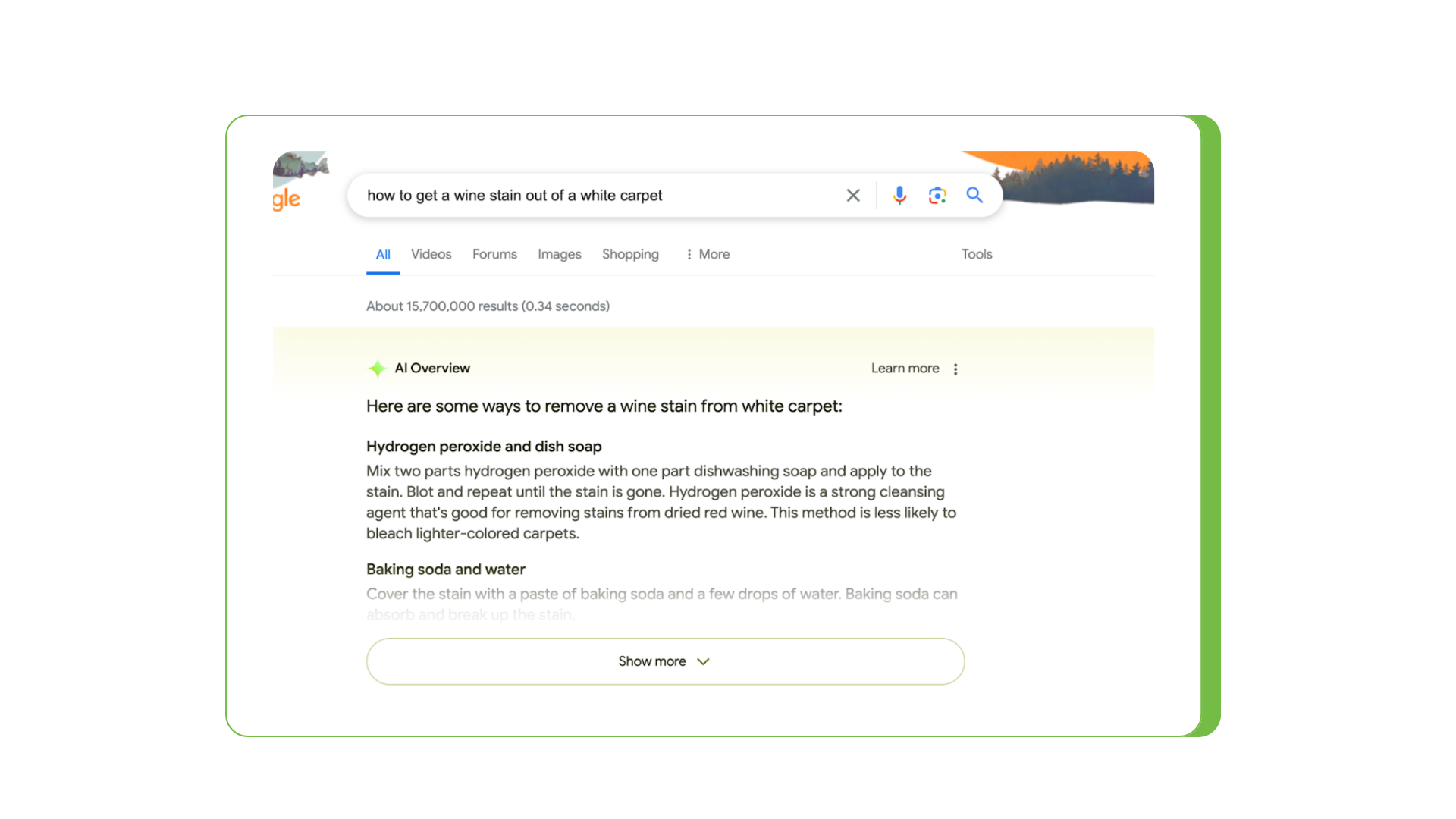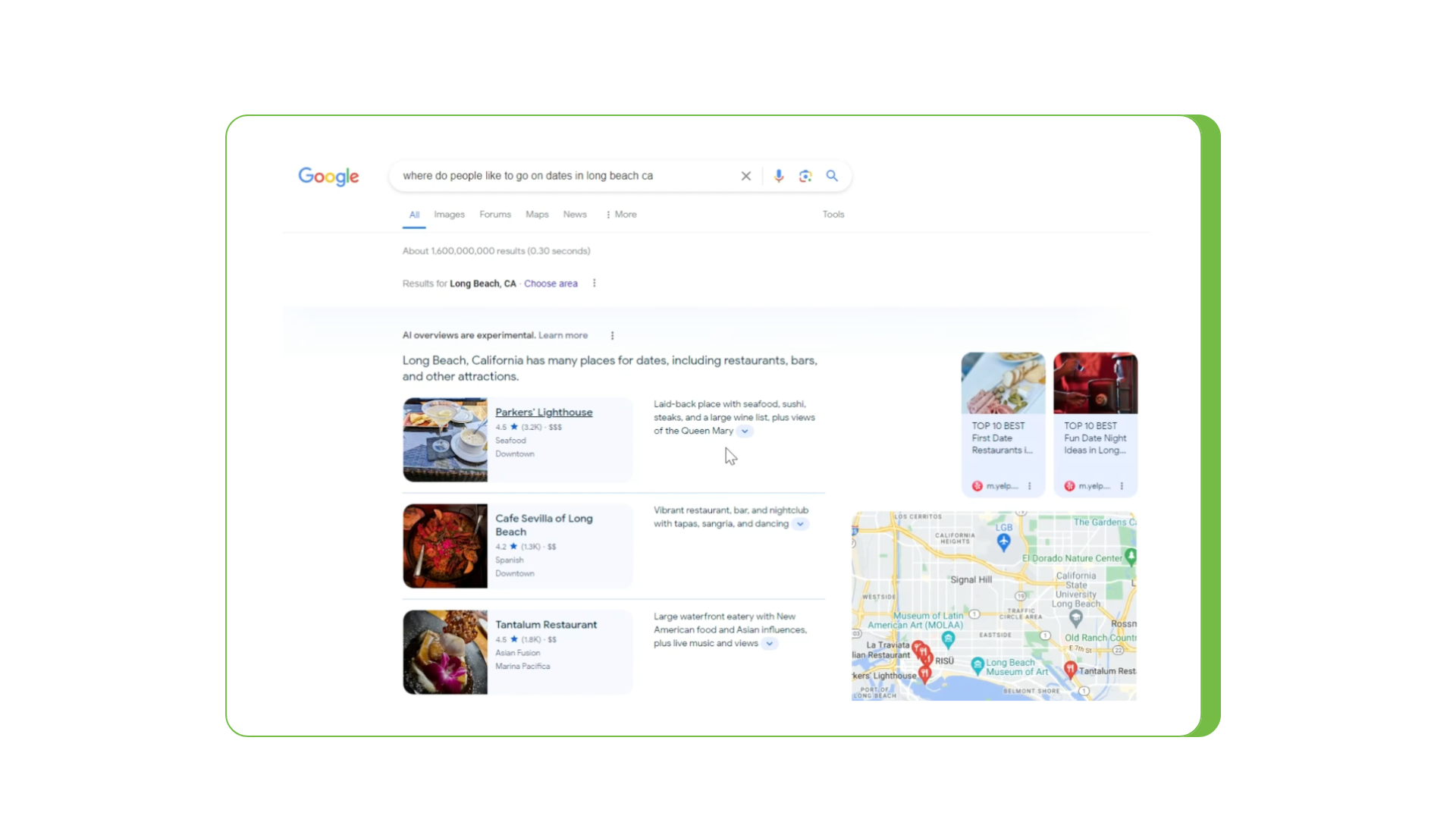Local Memo: AI Overviews Reduce Clicks, More Google Bug Reports, Evaluating Ranking Factors
What AI Search Means for Multi-Location Brands

What AI Search Means for Multi-Location Brands
We’ve been predicting for many months that generative AI would have a momentous impact on search. This week, back-to-back announcements from OpenAI and Google have shaken up the search community. Here’s our take on what that means for multi-location brands.
The News: AI Is Bigger, Stronger, and Available in Search
OpenAI announced on Monday, May 13 the release of its new, more powerful model GPT-4o, capable of processing audio, text, and vision in real time. Similarly, on Tuesday the 14th, Google’s I/O event announced multiple updates to its Gemini suite of AI models, as well as Project Astra, a tool developed by Google DeepMind that understands live video feeds of the world around it.
But for multi-location brands, the news that will have the biggest impact in the near future is the launch by Google of AI Overviews. You can think of AI Overviews as the release version of the Google Labs experiment known as Search Generative Experience (SGE), launched at Google I/O last year.
For the first time, a broad base of Google users will see AI-generated answers to questions asked in search, featured prominently at the top of the search result page. In fact, Google plans to roll out AI Overviews to over one billion users this year.
AI Overviews: One Answer, Not Just Ten Links
The big difference between AI Overviews and traditional search results is their approach to answering user questions. In the past, Google and other search engines offered a list of links in response to your query, and left it to you to determine which link was most likely to contain the answer you needed.
More recently, Google has delivered many answers to users in the search result page directly, in the form of Featured Snippets, Top Stories, Google 3-Pack results, and similar features. Now with AI Overviews, the intent is to answer the user’s question without the need to navigate your way through multiple results and features. In short, the proverbial ten blue links may be giving way to a single answer.

AI Overviews answers the query “how to get a wine stain out of a white carpet”
Will AI Be the Death of SEO?
For search results that include AI Overviews as a component, there’s a big shakeup underway. One of the most extensive studies of AI Overviews in its SGE experimental phase, conducted by ZipTie, found that:
- SGE responses were triggered for 82% of search queries
- 53% of the information sourced for SGE responses came from outside the top 10 search results
- The average SGE response referenced 4.45 sources
So we know that Google can potentially show an AI Overview for a broad range of query types, including local queries, and that the results are likely to be more than just a regurgitation of the top search results. Instead, AI Overviews will draw from and summarize sources based on a nuanced understanding of the search need. The rules of this new game aren’t fully understood, but we know that SEO will at minimum need to develop strategies for providing the source data AI Overviews need.
Some people are already speculating that AI Overviews will mean the end of traditional SEO, if not traditional content publishing. It’s probably too early to tell what the full impact will be, but let’s focus in on the local search side of things — the area that matters most for brands trying to compete in local markets.
Local Results in an AI Universe
We know that Google is fully capable of showing AI Overviews in response to local queries. In fact, we noticed this happening in the wild even before AI Overviews were officially launched.

An early AI Overview result for “where do people like to go on a date in long beach ca”
As with results in SGE, the AI Overviews we’ve seen thus far for local queries tend to contain five featured listings, in contrast to the three results in a typical Google 3-Pack. They reference some outside sources, such as Yelp, but mostly stick to information available in Google Business Profiles.
We don’t know yet how common these new AI-driven local results will be, but we do know that they will primarily rely on the Google profile information that multi-location brands should already be providing.
But pay attention to the fact that AI wants to deliver the exact answer to any query. Knowing this, users may be more likely to enter complex queries like the one Google showcased at I/O: “Find the best yoga or pilates studios in Boston and show me details on their intro offers, and walking time from Beacon Hill.” The bottom line: brands that provide all the detail AI is looking for will win out over those that don’t.
Steps to Take Now
Our research shows that Google’s AI-driven local results, both in its Gemini chatbot and in SGE, rely heavily on Google Maps data, in addition to some other prominent sources like Yelp. We are confident the same will hold true with AI Overviews.
This makes it more important than ever to optimize your local profiles and the corresponding store pages on your website. More than basic contact info, you need to provide photos, special hours, secondary categories, service features, menus, attributes and amenities — in short, utilize every feature available to your business in Google Business Profiles to answer questions consumers may have about what sets your business apart from the competition.
It’s going to be an interesting year. We’ll keep you informed as generative AI begins to impact how consumers engage with your business online.




